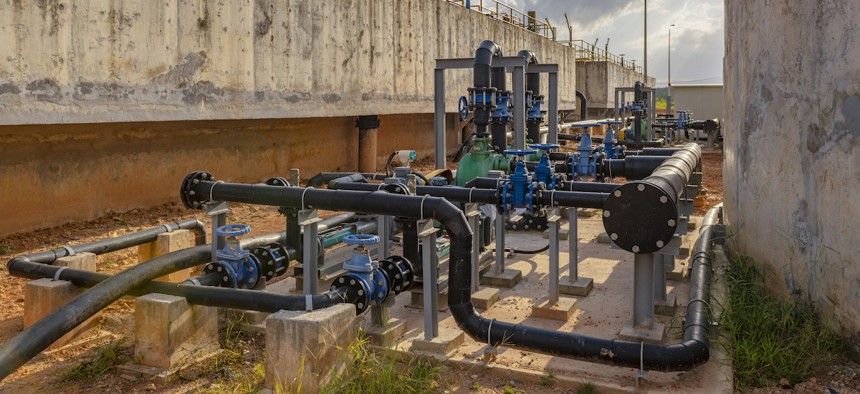Regional partnerships can bring a refreshing solution to aging water infrastructure

Kanok Sulaiman/Getty Images
When legacy water systems lack adequate data collection and monitoring capabilities, communities face an uphill battle delivering clean, safe water to residents.
The Hermits Peak-Calf Canyon fire last year burned more than 340,000 acres in northern New Mexico, leaving the air smoky, the land barren and water systems clogged with ash. To this day, water pollution continues to put the health of more than 13,000 residents of Las Vegas, New Mexico, at risk.
The city is working to get the water pollution under control, but tracking and remediating water problems relies on modern, connected infrastructure and skilled staff, said John Rhoderick, director of the water protection division of New Mexico’s Environment Department.
However, “none of that comes cheap,” Rhoderick said. Updating water management systems can be so expensive that state and local governments put off modernization, further exacerbating poor water conditions.
Indeed, state and local water sources face increasing threats, such as outdated lead pipes, “forever chemicals” that contaminate communities’ water supplies and fallout from natural disasters like the Hermits Peak-Calf Canyon fire. Based on data from 2019 to 2023, a recent Gallup poll found 56% of Americans worry “a great deal” about water pollution, making it one of the nation’s biggest environmental concerns.
One solution could be the regionalization of water systems or the connecting of separate systems to enable shared technology and staff capabilities. “Regionalizing can [help] communities share the technical staff, the operators, the administrative staff and the costs … to run their systems,” Rhoderick said.
An agency that joins a regionalization agreement, for instance, could have the financial and technical support to leverage innovative water management tools that previously went untapped. With wireless monitoring technology, for example, operators can continuously monitor water systems and be alerted when conditions change, Rhoderick said. Other connected devices can remotely control water valves so they can be opened or closed when needed for better flood management.
According to the Environmental Protection Agency, water system partnerships can also improve public health by enhancing communities’ ability to offer safe and affordable water to residents.
In New Mexico, regionalization has yet to take hold, Rhoderick said, but state agency officials continue to push its financial, workforce and environmental advantages to the public and policymakers.
In other areas of the country, however, the cooperative strategy is gaining traction. Earlier this year in Maryland, the governor approved a bill to establish the Baltimore Regional Water Governance Task Force. The group will be responsible for modernizing water system governance, operations and maintenance to ensure the “safe, efficient, equitable, and affordable water and wastewater systems serving the Baltimore region.” The task force ultimately aims to improve cross-jurisdictional communication, data sharing and system planning across the region.
In Texas, House representatives passed a bill in May that would allow public water and wastewater utilities to consolidate and operate under a single agency. Lawmakers argued that consolidation would support smaller utilities’ efforts to replace aging water infrastructure and gain technical assistance that they might not have had the funds to do so otherwise. The bill currently awaits a hearing in the state Senate.
California is also looking at water management consolidation. The State Water Resources Control Board supports partnerships among local utilities to “allow water systems to decrease costs and afford specialized personnel and equipment while sustainably managing local water supplies.” The agency even provides a step-by-step guide for communities considering a regional approach.
But first, state and local governments need solutions to help them identify individuals and locations that receive substandard service, Rhoderick said. Once local water problems are identified, patching together individual systems could help fill those service gaps.
“Two things you can pretty much count on is we’re never going to have enough water … and the cost of accessing and treating that water to make it safe is not going to get cheaper,” Rhoderick said.






